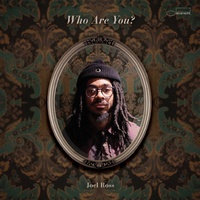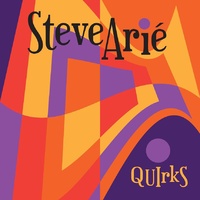2007 release
There have been a very few fine jazz (French horn) players appear now and then....we can add Sydney-based Stephen Morley to the list. He assembled a first-rate band...to play a program of mostly-original compositions... Followers of the Sydney scene won't be surprised to hear that Alder and Cutlan contribute strong solos, and that Spence, Elphick and Hall form a cohesive and attentive rhythm section. The primary news is Morley's own playing here, which is consistently impressive, and makes good use of the tonal qualities of his instrument...'
Adrian Jackson Rhythms
"Stephen Morley's agility on the instrument is matched by the quality of his compositions...Healthy portions of free improvisation and rich morsels of blues from seasoned campaigners flavour this surprisingly heroic recording."
Peter Wockner, ABC Limelight
"The tracks...swing between two stylistic poles: a classic Miles/Shorter/Hancock sound flavored occasionally with a melancholic Middle Eastern vibe in the manner of Dave Douglas; and epigrammatic explorations of soundcolor that sound freely improvised...Morley is the main composer, and his pieces tend to have a bittersweet, reflective quality even when they can be fast-moving and harmonically restless...undeniably a beautiful and vivacious album, taking full advantage of the lustrous, unusual sonority of the French horn, trumpet, and clarinet front-line combination, and benefiting from some excellent rhythm section work, especially Spence’s gracious piano.
It’s hard not to like an album that covers so much ground so confidently, from the calm gathering and dispersal of collective energies on Dawn and Dusk to the rumprolling Blue Note party-piece of Celebration.”
Nate Dorward, Cadence
Track listing >
Squall was formed in 200by French horn player/composer Stephen Morley, who arrived in Sydney after extensive studies and performance both in his native Melbourne and internationally. He has put together a formidable front line with trumpeter Warwick Alder (Bernie McGann Quartet, Ten Part Invention) and multi-instrumentalist Paul Cutlan (Australian Art Orchestra, MARA!). This versatile combination is ideally complemented by the piano of Alister Spence (Alister Spence Trio, Clarion Fracture Zone). Bassist Steve Elphick (Mark Simmonds, Sandy Evans, James Greening) and drummer Toby Hall (Mike Nock, The Catholics) round out this dynamic rhythm section.
Squall recorded their first CD, the self-titled Squall, in 200This album features original compositions by Morley, Spence, as well as a collection of free improvisations. It is an impressive debut, as reflected in this review from Sydney Morning Herald critic John Clare:
“Let us consider the French horn. It is reputedly hard to play. Therefore it has quirks, which are part of its character. It can display agility; but in jazz, until very recently, even very good players have sounded awkward playing syncopated running chromatic lines.
“Stephen Morley is outstanding in this regard, however, and he can use the instrument's quirks, along with extensions not unlike those in Messaien's From The Canyons To The Stars, in compelling free improvisation. He does both on Squall, but this disc is much more than a display of mastery by Morley. The beautiful tone and sometimes quirky sounds of the horn are part of a remarkable evocative and compositional whole.
“The title was suggested by the Norwegian `Skvall' - a strident cry. There are tracks, some freely improvised, in which texture, energy and powerful free momentum are the prime sources of feeling. But there are others too that are irresistibly melodic and rhythmic. Morley's writing has a certain Baltic flavour. The horn, in combination with clarinet, bass clarinet, saxophone and trumpet, gives a deep resonance to the dancing ensemble lines.
“Alister Spence's Metric Sheds has a complex jauntiness. Dave Holland's folk-like Four Winds is a fast, precise, yet abandoned dance. Both sit naturally beside Morley's compositions. Morley has chosen an outstanding ensemble of musicians renowned for their expressive power, flexibility and commitment to a wide span of music. Warwick Alder could be a surprise….I doubt that we have another trumpet player who is so convincing in so wide a range of contexts.
“A very complete, deeply satisfying disc.” John Clare
'Definitely not a novelty album...very evocative...cohesive...incredibly convincing.'
Jessica Nicholas ABC Radio National Music Show
Rating: ****
Much of Squall’s French Horn led music is out-of-tempo ambient, incorporating unorthodox use of instruments and effects: Free Suite comprises five short parts of spontaneous improvisation producing multi-textured auras. Several of these Sydney players, notably Paul Cutlan (reeds) and pianist Alister Spence, also play in the Australian Arts Orchestra, and some pieces evoke the AAO’s style scaled down to sextet size. Fifteen of the sixteen tracks are originals, mostly by leader Stephen Morley, and the moods are strongly atmospheric, portraying feelings, actions, or planetary aspects such as Dawn shimmering in brass and bowed bass sounds or the prepared piano and declamatory horn in the gathering darkness of Dusk. Other pieces are strongly rhythmic and melodic: Weave with a growing insistent groove under a mid Eastern line, and Metric Sheds where trumpet, alto, and horn pass a syncopated theme between them. Squall has the French Horn at the very bottom ‘snuffling away with the bass clarinet’ while drummer Toby Hall lashes about in a truly squalling tempestuousness. - John McBeath The Weekend Australian
The jazz French horn player is a rare beast. A brief survey of my CD collection turns up a few in various Gil Evans ensembles; a Hank Mobley album called A Slice of the Top, which I thought had a French horn on it, but it turns out to be a euphonium and a tuba; and there’s a guy on a couple of Henry Threadgill discs that I’ve got but I can’t find them (yes, it is time to declare martial law and impose order on my CDs).
Whatever may be the reason for this rarity – whether the dictates of fashion, the difficulty of the instrument, or just that a French horn costs a lot – I believe it works in Stephen Morley’s favour. He and his band, Squall, have released a self-titled album of music that avoids cliché. Perhaps because there have been no strong instrumental leaders on the jazz French horn, that dominant, guiding authority is not present. In this case, the music benefits from its absence. Each of the musicians – Morley on the French horn, Warwick Alder (trumpet), Paul Cutlan (reeds), Alister Spence (piano), Steve Elphick (bass), Toby Hall (drums) – finds new paths through the parts they play. The music, from the ensemble playing to the solo improvisation, sounds fresh because of this cliché free approach.
Some of the tunes are composed and some are free improvistions, though all seem to have some form of intent behind them that makes the entire recording very cohesive. The opening track, Dawn, for example, sounds improvised but paints a clear picture of the sun rising. It starts off very quiet and sparse, a few knocks on the bass leading to bowing, random drum rattles, a few sqeaks from bass clarinet and then some long ray-like tones on the French horn. Dawn is evoked and the track ends. It makes the ethos clear from the start: this album is about group creation. With each track the music achieves its goals through group interaction. A very similar musical effect is created by the title track, Squall. It’s an exploration of the lower registers of the French horn and the bass clarinet that does present the impression of a squall, even though it doesn’t sound like one. Again, the music is improvised but it is clear there is a cohesive intent behind it.
The emphasis on the collective is also evident on the composed tracks such as Weave and Spence’s Metric Sheds. The latter has a Monk-style head followed by a beautifully spaced group improvisation section that becomes syncopated enough to be described as “funky”. The former, “Weave”, features a flowing melody that weaves in and out of a repeated bass statement. It’s based on a mode which the liner notes describe as having an “eastern flavour”. Maybe they’re not the right words any more (east of the east coast of Australia: New Zealand? Sounds more of a Persian thing to me), but the group interaction is again given the fore. Of special note here is the dynamic between Hall’s drums and Elphick’s bass. They are perfect for the tune and make the music float along, as though drifting skywards on a magic carpet (there you go: Persian). The sound of the drums adds to this feeling. The kit sounds crisp and present but has a sense of space about it. Presumably, the credit for this should fall somewhere between the engineer, Yossi Gabbay, and the drumkit.
The final thing to comment on is the French horn playing itself. The instrument sounds beautiful in ensemble parts. It gives the group sound tremendous texture and depth. Listen to Run Slowly: a simple melodic statement, filled out perfectly by the presence of the instrument itself, transforms into a Morley solo – simple, direct and thoughtful. For me, the highlight of the album. - Greg Levine
(9399033307424)
| SKU | 9399033307424 |
| Barcode # | 9399033307424 |
| Brand | Australian Independent - Rufus Records |
Be The First To Review This Product!
Help other Birdland Records users shop smarter by writing reviews for products you have purchased.










